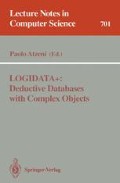Abstract
In this paper we present the Logidata Object Algebra (LOA), an algebra for complex objects which has been developed within LOGIDATA+, a national project funded by the Italian National Research Council, as an internal language in a prototype system for the management of extended relational databases with complex object types. LOA is a set-oriented manipulation language which was conceived as an internal language for a prototype system.
More precisely it is supposed that user programs, expressed in the external high level language have to be compiled into LOA programs, and then processed by an underlying Object Manager.
In other words LOA is supposed to play in our prototype the same role as the relational algebra in a relational system with a very high level user environment. That is providing a suitable formal framework to develop efficient access to mass storage and powerful query optimization strategies.
The algebra refers to a data model that includes structured data types and object identity, thus allowing both classes of objects and value-based relations.
LOA must support a rule based language with possible recursive programs with limited forms of negation. LOA programs explicitly include a Fixpoint operator over a set of equations. Another original feature of the algebra is the ability to cope with object identity, and, at the same time, to preserve the capability of handling value based complex structures without identity. This is obtained by extending the semantics of classical operators of the relational algebra to deal with the Logidata data structures, and by introducing additional operators, such as type conversion and oid invention. The paper also briefly discusses some implementation issues of the Fixpoint operator and the other algebraic primitives.
Preview
Unable to display preview. Download preview PDF.
References
S. Abiteboul and C. Beeri. On the Power of Languages for the Manipulation of Complex Objects. Technical Report 846, INRIA, 1988.
S. Abiteboul and N. Bidoit. Nonfirst normal form relations: an algebra allowing data restructuring. Journal of Comp. and System Sc., 33 (1), 361–393, 1986.
S. Abiteboul and S. Grumbach. Col: a logic-based language for complex objects. Proceedings International Conference on Extending Database Technology), Venezia, Lecture Notes in Computer Science, 303, 271–293, Springer-Verlag, 1988.
S. Abiteboul and P. Kanellakis. Object identity as a query language primitive. Proceedings ACM SIGMOD International Conf. on Management of Data, 159–173, 1989.
R. Agrawal. Alpha: An Extension of Relational Algebra to Express a Class of Recursive Queries. IEEE Transactions on Software Engineering, 14 (7), July 1988.
A. V. Aho and J. D. Ullman. Universality of Data Retrieval Languages. Proceedings ACM Conference on Programming Languages, 110–120, 1979.
P. Atzeni and L. Tanca. The LOGIDATA+ Rule Language. Proceedings Workshop “Information Systems '90”, Kiev, 1990.
F. Bancilhon and S. Khoshafian. A calculus for complex objects. Journal of Comp. and System Sc., 38(3):326–340, 1989.
F. Cacace, S. Ceri, S. Crespi-Reghizzi, L. Tanca, and R. Zicari. Integrating Object-Oriented Data Modeling with a Rule-Based Programming Paradigm. Proceedings ACM SIGMOD International Conf. on Management of Data, 225–236, 1990.
S. Ceri, S. Crespi-Reghizzi, G. Lamperti, L.A. Lavazza, and R. Zicari. ALGRES: an advanced database system for complex applications. IEEE Software, 7(4), July 1990.
S. Ceri, G. Gottlob and L. Tanca. Logic Programming and Databases. Springer Verlag, 1990.
A. K. Chandra. Theory of Database Queries. Proceedings ACM Symposium on Principles of Database Systems, 1–9, 1988.
L. S. Colby. A Recursive Algebra and Query Optimization for Nested Relations. Proceedings ACM SIGMOD International Conf. on Management of Data, 273–283, 1989.
E.F. Codd. A relational model for large shared data banks. Communications of the ACM, 13 (6), 377–387, 1970.
P.C. Fischer and S.J. Thomas. Operators for non-first-normal-form relations. Proceedings IEEE Computer Software Applications, pages 464–475, 1983.
Y. Gurevich and S. Shelah. Fixed-point extensions of first-order logic. Annals of Pure and Applied Logic, 32, Noth Holland, 1986, 265–280. Also in Proceedings Int. Conf. on Foundations of Computer Science, 346–353, 1985.
R. Hull and J. Su. On accessing Object-Oriented Databases: Expressive Power, Complexity, and Restrictions. Proceedings ACM SIGACT SIGMOD Symposium on Principles of Database Systems, 147–158, 1989.
G. Jaeschke and H.-J. Schek. Remarks on the algebra for non first normal form relations. Proceedings ACM SIGACT SIGMOD Symposium on Principles of Database Systems, 124–138, 1982.
S. Khoshafian and G. Copeland. Object identity. Proceedings ACM Symposium on Object Oriented Programming Systems, Languages and Applications, 1986.
G.M. Kuper. The Logical Data Model: A New Approach to Database Logic. PhD thesis, Stanford University, 1985.
G.M. Kuper and M.Y. Vardi. A New Approach to Database Logic. Proceedings Third ACM SIGACT SIGMOD Symposium on Principles of Database Systems, 1984.
G.M. Kuper and M.Y. Vardi. On the complexity of queries in the logical data model. Proceedings International Conference on Data Base Theory, 267–280, 1988.
U. Nanni, S. Salza, and M. Terranova. LOA: the LOGIDATA+ Object Algebra. Technical Report 5/23, Progetto Finalizzato Sistemi Informatici e Calcolo Parallelo, 1990.
U. Nanni, S. Salza, and M. Terranova. An Algebraic Approach to the Manipulation of Complex Objects. Proceeding Hawaii International Conference on System Sciences, Kaloa, Hawaii, January 7–10, 1992.
U. Nanni, S. Salza, and M. Terranova. The LOGIDATA+ Prototype System. In this volume.
M. A. Roth, H. F. Korth, and A. Silberschatz. Extended Algebra and Calculus for Nested Relational Databases. ACM Trans. on Database Syst., 13 (4), 389–417, December 1988.
H.-J. Schek and M.H. Scholl. The relational model with relation-valued attributes. Information Systems, 1986.
M.H. Scholl and H.-J. Schek. A relational object model. Proceedings International Conference on Data Base Theory, Paris, Lecture Notes in Computer Science, 470, 89–105, 1990.
J. D. Ullman. Database and Knowledge-Base Systems (vol. I). Computer Science Press, 1988.
Author information
Authors and Affiliations
Editor information
Rights and permissions
Copyright information
© 1993 Springer-Verlag Berlin Heidelberg
About this chapter
Cite this chapter
Nanni, U., Salza, S., Terranova, M. (1993). LOA: the LOGIDATA+ Object sAlgebra. In: Atzeni, P. (eds) LOGIDATA+: Deductive Databases with Complex Objects. Lecture Notes in Computer Science, vol 701. Springer, Berlin, Heidelberg. https://doi.org/10.1007/BFb0021898
Download citation
DOI: https://doi.org/10.1007/BFb0021898
Published:
Publisher Name: Springer, Berlin, Heidelberg
Print ISBN: 978-3-540-56974-9
Online ISBN: 978-3-540-47844-7
eBook Packages: Springer Book Archive

